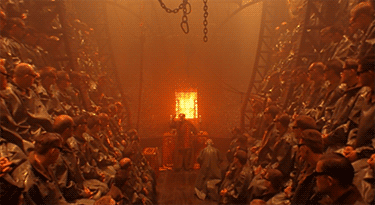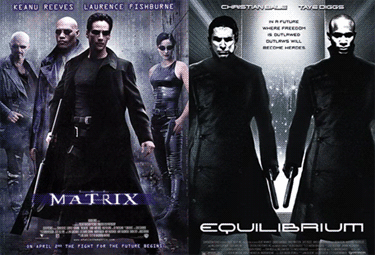Lucidno
| Hackers is a film worth discussing, as it raises several issues, and very correctly, we might add, thus managing to create its own momentum. The world it depicts is one in which programmers become important pieces in the social hierarchy. With a good internet connection and a lot of patience, we understand that coups can be staged, major irregularities of the public institutions can be unveiled, and even countries can be lead. The film manages, thus, to draw attention to the influence of this medium, which was new at the time, being, simultaneously, a social manifesto.
Children are no longer just children, since they have the capacity to change history – and I am not necessarily saying they do so, at least not at the level discussed here, but they do possess this untapped ability. Furthermore, the film brings out the idea that anyone can become a hero or a terrorist, and this without even having to move from their own desks.
Johnny Mnemonic (1995) (Image 5) is another fundamental example of this subgenre. A different Neo in the foreground, Keanu Reeves plays his cards very well. His lack of expressivity is carefully exploited by director Robert Longo. He's playing a man transformed into a robot by his own profession, this being his most suitable role in the entire career. The story is intricate, without any cracks, and presented in a coherent manner. In this regard, many of the other productions discussed here are found lacking because of the amount of new information they bring forth, at times without any style or clarity. Precisely because of this desire to display as many novel elements as possible, they end up unable to explain them properly and calmly due to time limitations, which leads to them overwhelming the viewers through excess. This is not the case for this particular movie. Strange Days (1995) presents Ralph Fiennes in a rather unusual and unique part in his career. A former policeman, he is currently a dealer of some sort of goggles that induce a very realistic state of mind to the person wearing them. Everything revolves around entering the new millennium, as the protagonist has to solve an overwhelming situation in a limited amount of time. The cyberpunk features present here are doubled by a cold, dirty and heavy atmosphere. The City of Lost Children (1995) (Image 6) is one of the few auteur films on the list.13 It resembles Brazil as far as mood, rhythm and folly are concerned, but the background is completely different. In a surreal society, a scientist kidnaps children in order to steal their dreams, hoping he will manage to slow down his ageing. But the story is almost irrelevant. This cinematic work is rather empirical, synonymous with a bizarre reverie, very similar to a film made by the same two directors a few years before, Delicatessen. Even this orange-greyish hue came to be a distinctive feature of their work. Gattaca (1997) is another milestone of the genre (Image 7). A complex work with regard to mise-en-scène and subject, the film resorts to a neat presentation, which differentiates it from the majority of films with cyberpunk features. At the same time, the film can be attributed to several SF-subgenres, and interpreted at many different levels: social, political, artistic. Vincent Freeman – a predestined name, chosen intentionally and perhaps a bit too obviously by director-screenwriter Andrew Niccol – played by Ethan Hawke, is a man born by natural means in a society in which conception is genetically manipulated. He is, therefore, an inferior human being, destined to a marginal life and a quick death. He dreams of flying into space. The plot is rich whereas the action – in which we see a metallically organized world –, contains no more turnarounds than necessary. Gattaca is a film with pronounced Hollywood characteristics, which, however, do not diminish its value. Pi (1998) is Darren Aronofsky's debut film. An incoherent work, it exhibits, nonetheless, the germs of a style that the director would subsequently articulate more and more clearly. With its topic, execution and ending, Dark City (1998) foretells Matrix (1999), reason for which these productions have often been compared to one another. Actually, Equilibrium (2002), is also a part of this trident, but it is rather „the younger, less talented brother". The themes are pretty much the same, and the narrative structures – especially regarding the lead character and the journey he makes to discover his abilities – are very similar. Just one look at the posters (Image 8) is enough to discover almost annoying similarities. |
 eXistenZ (1999) is a crossbreed between Matrix and Strange Days, but it has its own force due to the fact that the virtual reality is transferred into a game. The junction and the merging between reality and imagination are so well executed that one is no longer sure in which reality the characters are; Avalon (2001), Minority Report (2002) and Immortel (2004) are the last on the list. These are three very diverse productions. The first is a minimalistic Polish-Japanese SF, the second displays a certain magnitude and has a weird topic that is coherently presented, but nothing more, and the third is a pretentious French animation that does not manage to convince, due to the lack of coherence. In my opinion, approximately 20 years after its official debut, the cyberpunk genre didn't manage to draw the public's attention anymore. Perhaps the idea of a world brought to disarray by a worldwide disaster became redundant. I also suspect that video-games had reached a high enough level to attract cyberpunk fans towards all kinds of simulators. That is to say, to "live their dream". Of course there were other productions that resonated with this subgenre, but I have the feeling that they were made on a whole different level compared to what cyberpunk had meant at its beginnings. They no longer had the initial naiveté and the characters had somehow become too "proper" – at times the misery had been replaced by a far too prevailing order. Most likely due to the passage of time, a different approach can be noticed; an approach that alienates from what cyberpunk originally meant. As already mentioned, the films discussed here are to a greater or lesser extent part of this SF subgenre. Some choices would certainly lead to polemics, while others would be unanimously accepted, and this is why I believe cyberpunk was more of an experience, a trend that many directors adopted because it served their vision and purpose of creating dystopian worlds. They took an already existing formula and shaped it according to their own wish. It is much easier to do so than to imagine a whole new dimension, as, in this case only Fritz Lang (Metropolis), Ridley Scott (Blade Runner), Terry Gilliam (Twelve Monkeys), the Wachowski brothers (Matrix), Marc Caro-Jean and Pierre Jeunet (City of Lost Children), Chris Marker (La Jetée) and, partially Gerald Potterton (Heavy Metal), succeeded.
Cyberpunk started as a literary movement and then became a cinema subgenre, but I think it is currently only a trend, at the most. The technological progress in the last thirty years has been so significant, that many gadgets we saw in cult movies from the end of the 20th century today seem toys compared to the offer of the real, tangible market we can access. Cell phones with touch screen are now available everywhere; interactive goggles equipped with computer features, possibly turning into future best friends to humans are on the verge of becoming a reality; prostheses offering the crippled a normal life are nowadays so developed, that they allow them to take part in athletic competitions114, TV-sets weigh as much as a remote control did years ago. What is next? Perhaps artificial intelligence, and who knows, a third World War, maybe precisely against the metal rebellion! Ion Indolean |
_____________________
13. Term originated from the French auteur.
14. http://en.wikipedia.org/wiki/Oscar_Pistorius, accessed on the 21st of January 2014.



